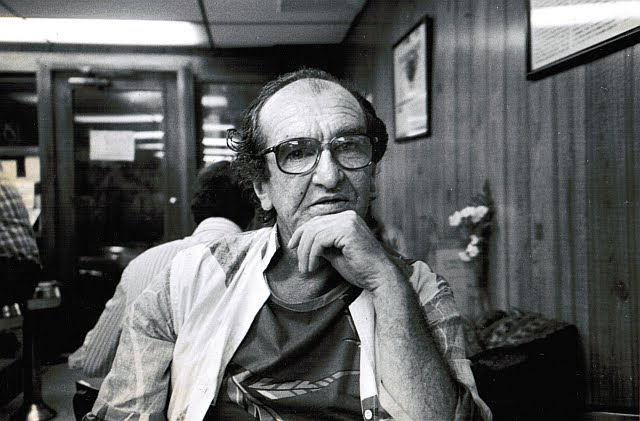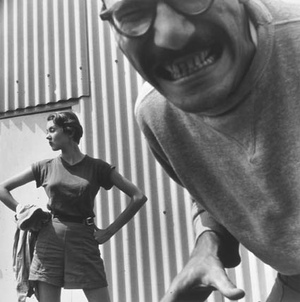<Back to Index>
- Poet John Joseph Wieners, 1934
- Poet Joel Lester Oppenheimer, 1930
PAGE SPONSOR

John Joseph Wieners (6 January 1934 – 1 March 2002) was an American lyric poet.
Born in Milton, Massachusetts, Wieners attended St. Gregory Elementary School in Dorchester, Massachusetts, and Boston College High School. From 1950 to 1954, he studied at Boston College, where he earned his A.B. In 1954 he heard Charles Olson read at the Charles Street Meeting House on Beacon Hill during Hurricane Hazel. He decided to enroll at Black Mountain College where he studied under Olson and Robert Duncan from 1955 to 1956. He then worked as an actor and stage manager at the Poet’s Theater in Cambridge, and began to edit Measure, releasing three issues over the next several years.
From 1958 to 1960 Wieners lived in San Francisco, California, and actively participated in the San Francisco Poetry Renaissance. The Hotel Wentley Poems was published in 1958, when Wieners was twenty - four.
Wieners returned to Boston in 1960 and was committed to a psychiatric hospital. In 1961, he moved to New York City and worked as an assistant bookkeeper at Eighth Street Books from 1962 - 1963, living on the Lower East Side with Herbert Huncke. He went back to Boston in 1963, employed as a subscriptions editor for Jordan Marsh department stores until 1965. Wieners’ second book, Ace of Pentacles, was published in 1964.
In 1965, after traveling with Olson to the Spoleto Festival and the Berkeley Poetry Conference, he enrolled in the Graduate Program at SUNY Buffalo. He worked as a teaching fellow under Olson, then as an endowed Chair of Poetics, staying until 1967, with Pressed Wafer coming out the same year. In 1968, he signed the “Writers and Editors War Tax Protest” pledge, vowing to refuse tax payments in protest against the Vietnam War. In the spring of 1969, Wieners was again institutionalized, and wrote Asylum Poems.
Nerves was released in 1970, containing work from 1966 to 1970. In the early 1970s, Wieners became active in education and publishing cooperatives, political action committees, and the gay liberation movement. He also moved into an apartment at 44 Joy Street on Beacon Hill, where he lived for the next thirty years.
In 1975, Behind the State Capitol or Cincinnati Pike was published, a magnum opus of “Cinema decoupages; verses, abbreviated prose insights.” For the next ten years, he published rarely and remained largely out of the public eye. In 1985, he was a Guggenheim Fellow.
Black Sparrow Press released two collections edited by Raymond Foye: Selected Poems: 1958 - 1984 and Cultural Affairs in Boston, in 1986 and 1988 respectively. A previously unpublished journal by Wieners came out in 1996, entitled The Journal of John Wieners is to be called 707 Scott Street for Billie Holliday 1959, documenting his life in San Francisco around the time of The Hotel Wentley Poems.
At the Guggenheim Museum in 1999, Wieners gave one of his last public readings, celebrating an exhibit by the painter Francesco Clemente. A collaboration between the two, Broken Women, was also published.
Wieners died on March 1, 2002 at Massachusetts General Hospital in Boston, having collapsed a few days previously after an evening attending a party with his friend and publisher Charley Shively. Kidnap Notes Next, a collection of poems and journal entries edited by Jim Dunn, was published posthumously in 2002.
A Book of Prophecies was published in 2007 from Bootstrap Press. The manuscript was discovered in the Kent State University archive's collection by poet Michael Carr. It was a journal written by Wieners in 1971, and opens with a poem titled 2007.
His papers are held at the University of Delaware.

Joel Lester Oppenheimer (Jacob Hammer) (February 18, 1930 – October 11, 1988) was an American poet associated with both the Black Mountain poets and the New York School. He was the first director of the St. Marks Poetry Project (1966 - 68). Though a poet, Oppenheimer was perhaps better known for his columns in the Village Voice from 1969 to 1984.
Oppenheimer was born in Yonkers, New York, attended Cornell University for one year in 1948, spent less than one semester at the University of Chicago, and in 1950 enrolled at Black Mountain College in North Carolina. At Black Mountain, he studied with Paul Goodman and poet Charles Olson, became friends with Fielding Dawson and Ed Dorn, and worked in the school's print shop.
In his earliest poetry, Oppenheimer shows clearly the influence of William Carlos Williams, but he soon developed his own style. While at Black Mountain, Oppenheimer met and married his first wife, Rena Furlong. He left the school in January 1953 without taking a degree, eventually settling in New York and working in a print shop while continuing to write poetry.
His first publications were The Dancer (1951), as Jargon, no. 2, 1951, by The Sad Devil Press / Black Mountain College; The Dutiful Son (1956) by Jonathan Williams's Jargon Society, reprinted by LeRoi Jones's Totem Press in 1961, The Love Bit and Other Poems (1962), again with Totem. His satiric Western drama The Great American Desert was the first play produced by Robert Nichols, directed by Lawrence Kornfeld, who had been with the Living Theatre, at the Judson Poets' Theatre. It opened on November 18, 1961.
Oppenheimer's poetry has been collected in two volumes: Robert J. Bertholf (editor, introduction), Collected Later Poems of Joel Oppenheimer, with eleven drawings by John Dobbs, The Poetry Collection, 1997 and Names & Local Habitations (Selected Earlier Poems 1951 - 1972), editor Jonathan Williams, The Jargon Society, 1988.
He also published two nonfiction works, The Wrong Season, Bobbs - Merrill 1973, about the New York Mets, and Marilyn Lives, Delilah, 1984, on Marilyn Monroe. Drawing from Life, posthumously published in 1997, gathered 92 columns written for the Village Voice. Library Journal wrote that Drawing from Life "emphasizes several favorite themes: baseball, politics and the role of the changing seasons in our lives".
Oppenheimer died at 58 of lung cancer in Henniker, New Hampshire, on October 11, 1988.
Don’t Touch the Poet: The Life and Times of Joel Oppenheimer, by Lyman Gilmore, was published by Talisman Press in 1998.